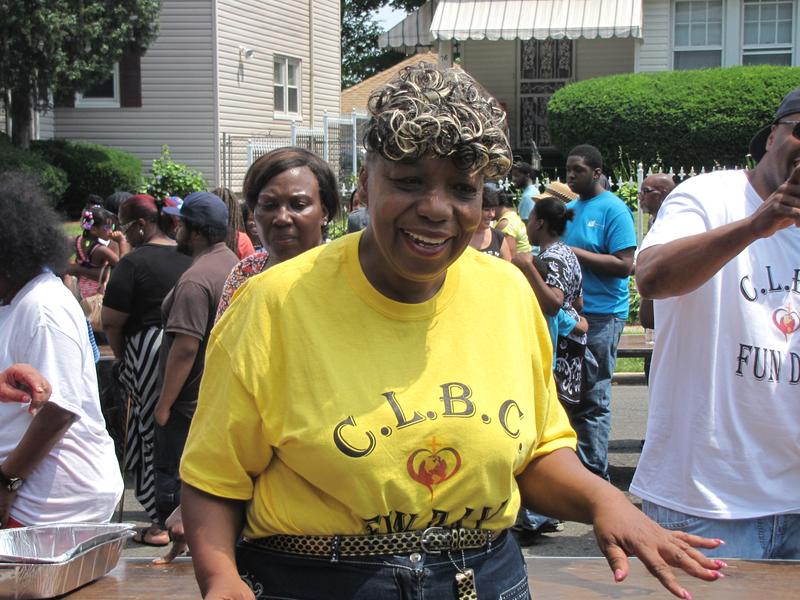
It’s a scorching Saturday afternoon in July, and hundreds of people fill the streets around the Christian Love Baptist Church in Irvington, N.J., for its annual "fun day." Under a white tent, worshippers and locals clap and sing — energized by a live gospel choir. The line for free burgers, hot dogs and fried fish is four deep. Children clad in swimsuits plunge down an inflated water slide.
Even in this bustling crowd, Gwen Carr is hard to miss as she weaves her way towards the church. With her trademark hair — a pile of tousled gold-and-black curls that frame a warm smile — she is easy to spot.
Over the last year, her image has been captured on hundreds of media sites around the globe.
She is the mother of Eric Garner, the Staten Island man who died a year ago after being placed in a chokehold by police. Most in this church never met her son, but his story feels painfully familiar to many in this predominantly black city that sits in the shadow of Newark.
Because of the infamous video, they know his final pleas: “I can’t breathe. I can’t breathe. I can’t breathe” — words uttered anxiously, desperately and ultimately in vain, to a group of New York City police officers who surrounded him, forced him to the ground, and — many in this community believe — killed him.
Tyrese Wooten-Outlaw, a minister at Christian Love, remembers when Carr showed up at the historic, brick-front church nearly six months ago at the invitation of her nephew. When the pastor introduced them, the congregation responded with a standing ovation.
“It was the pain. It was the love. It was the mixture,” says Wooten-Outlaw. “We were honored to have them fellowship with us.”
Before her son's death, Carr’s visit to the church would not have brought the same level of attention. Carr, 65, was unknown to the public and happily so, she says.
“I was just going about my daily routine, minding my business, a very low-keyed individual. Life was okay as I know it,” she says, sitting in a storage room at the church, as her husband Benjamin Carr — Eric Garner’s stepfather — is hard at work frying fish for the masses.
“I had bills,” Carr says matter-of-factly, “but I had a job. I had the basic necessities, and as far as I was concerned, my children were good. My grandchildren were good. It was like, life was okay.”
That changed abruptly on July 17, 2014. She was in the middle of her shift as a subway train driver for the MTA when she learned something was wrong with her son. When her husband told her he was dead, she says, “I just, like sort of lost my mind.”
Since her son’s death, she has become an activist for civil rights — and a guiding force for other mothers of black men in New York who have died in encounters with police.
Her activism helped spur Gov. Andrew Cuomo to sign an executive order designating a special prosecutor to handle cases in which civilians die at the hands of police. A local district attorney handled the probe of Daniel Pantaleo — the NYPD officer who put Garner in a chokehold. When a grand jury declined to indict Pantaleo, questions were raised about whether local DAs could investigate free of bias.
Not the First Challenge
Carr has risen above challenges before.
At 26, her husband — Eric Garner’s father — died from a stroke, leaving her with three children, ages 4 months, 4 years old and 5 years old. With help from her parents, Carr went back to school and earned an accounting degree.
When her brother and his wife died a few years later, she took in his three children without hesitation — raising the brood of six on her salary as a post office accounting technician, in a house she bought in Bedford-Stuyvesant.
“My brother would have did the same for me,” she says. “I never even put them on welfare.” She didn’t want to go to the state “begging.”
Carr has not forgiven Pantaleo. This is something she is giving time.
And she doesn’t think all police officers are bad.
“But you’ve got some bad apples and you have to get rid of them,” she says. "Human beings shouldn’t be treated as cattle or chattel or as nobodies.”
At Christian Love, church members seem eager to serve Carr. They offer her cold water to beat back the stinging heat. A woman gives her a hug.
“They’ve been very beautiful — showed us a lot of love,” Benjamin Carr, Garner’s step-father, says as he turned golden pieces of fried cod in a metal pot of crackling oil. He volunteered to cook for the event.
Gwen Carr knows the week ahead will include ceremonies, speaking engagements and press interviews — all commemorating the one-year anniversary of Eric Garner’s death.
But on this hot July day, there are no TV cameras, politicians or protests. It’s a regular day to enjoy family, friends, and memories of her son.
